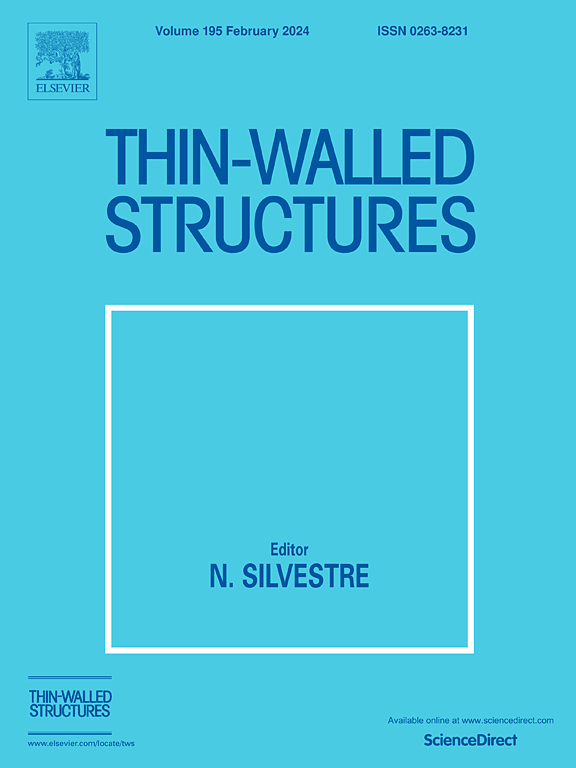A rationalized macroscopic failure criterion of composite woven fabrics for airship structures
IF 5.7
1区 工程技术
Q1 ENGINEERING, CIVIL
引用次数: 0
Abstract
Composite woven fabrics are increasingly employed in architecture and aerospace for their excellent properties, such as lightweight, high specific strength, large surface area, and satisfactory deployability. The strength behavior is essential for various membrane structures as structural failure is serious. However, an accurate, simplified, and universal failure criterion has not been reported due to the inherent complexities of composite woven fabrics. This paper thus studies the tensile strength behaviors of airship fabrics and proposes a rationalized macroscopic failure criterion (Chen-Chen criterion) based on theoretical analysis and experimental observations. The generalized Chen-Chen criterion inherently satisfies the conditions of symmetry, dimensionless, and uniaxial tensile strength (UTS) boundary, with a maximum absolute deviation of only 1.34 % for two airship fabrics. Additionally, the UTS-based criteria were derived particularly for flexible plain-weave polyesters to avoid laborious and costly biaxial strength tests. The average deviations of constant and linear Chen-Chen criteria are 6.01 %, 4.91 %, while that of the Norris criterion reaches 13.34 %. Furthermore, the numerical implementation of the Chen-Chen criterion was demonstrated by biaxial tensile simulations. The failure strength and location predicted by the numerical analysis show good consistency with the experimental results.
用于飞艇结构的复合编织物的合理化宏观失效标准
复合编织物具有重量轻、比强度高、比表面积大、可展开性好等优良特性,因此越来越多地应用于建筑和航空航天领域。强度行为对各种膜结构至关重要,因为结构失效是非常严重的。然而,由于复合编织物固有的复杂性,准确、简化和通用的失效标准尚未见报道。因此,本文在理论分析和实验观察的基础上,研究了飞艇织物的拉伸强度行为,并提出了合理化的宏观失效准则(Chen-Chen 准则)。广义的 Chen-Chen 判据本质上满足对称、无量纲和单轴抗拉强度(UTS)边界条件,两种飞艇织物的最大绝对偏差仅为 1.34%。此外,基于 UTS 的标准特别适用于柔性平纹聚酯,以避免费力且昂贵的双轴强度测试。恒定和线性 Chen-Chen 准则的平均偏差分别为 6.01 % 和 4.91 %,而 Norris 准则的平均偏差则达到 13.34 %。此外,双轴拉伸模拟也证明了 Chen-Chen 准则的数值实施。数值分析预测的破坏强度和破坏位置与实验结果显示出良好的一致性。
本文章由计算机程序翻译,如有差异,请以英文原文为准。
求助全文
约1分钟内获得全文
求助全文
来源期刊

Thin-Walled Structures
工程技术-工程:土木
CiteScore
9.60
自引率
20.30%
发文量
801
审稿时长
66 days
期刊介绍:
Thin-walled structures comprises an important and growing proportion of engineering construction with areas of application becoming increasingly diverse, ranging from aircraft, bridges, ships and oil rigs to storage vessels, industrial buildings and warehouses.
Many factors, including cost and weight economy, new materials and processes and the growth of powerful methods of analysis have contributed to this growth, and led to the need for a journal which concentrates specifically on structures in which problems arise due to the thinness of the walls. This field includes cold– formed sections, plate and shell structures, reinforced plastics structures and aluminium structures, and is of importance in many branches of engineering.
The primary criterion for consideration of papers in Thin–Walled Structures is that they must be concerned with thin–walled structures or the basic problems inherent in thin–walled structures. Provided this criterion is satisfied no restriction is placed on the type of construction, material or field of application. Papers on theory, experiment, design, etc., are published and it is expected that many papers will contain aspects of all three.
 求助内容:
求助内容: 应助结果提醒方式:
应助结果提醒方式:


